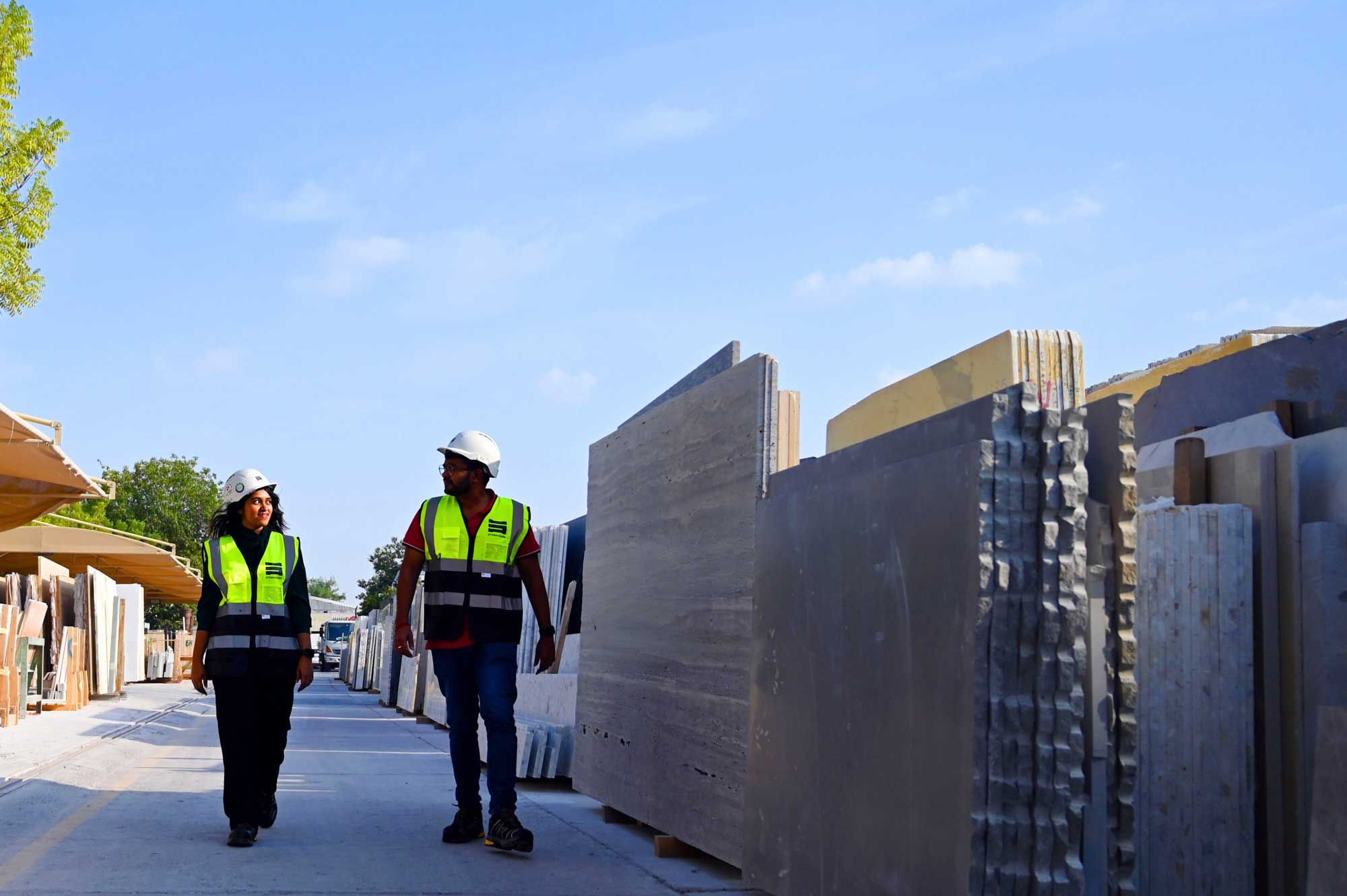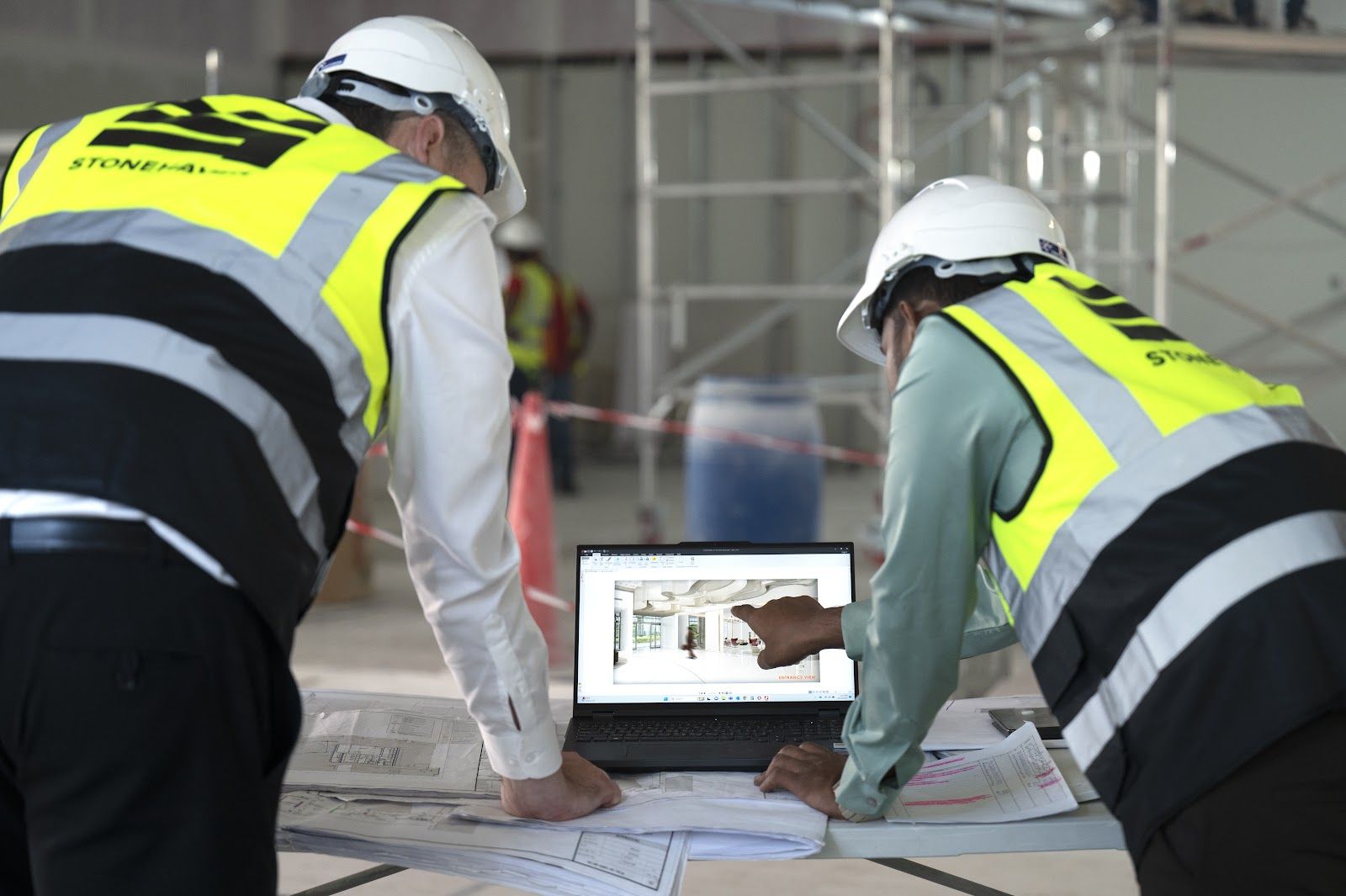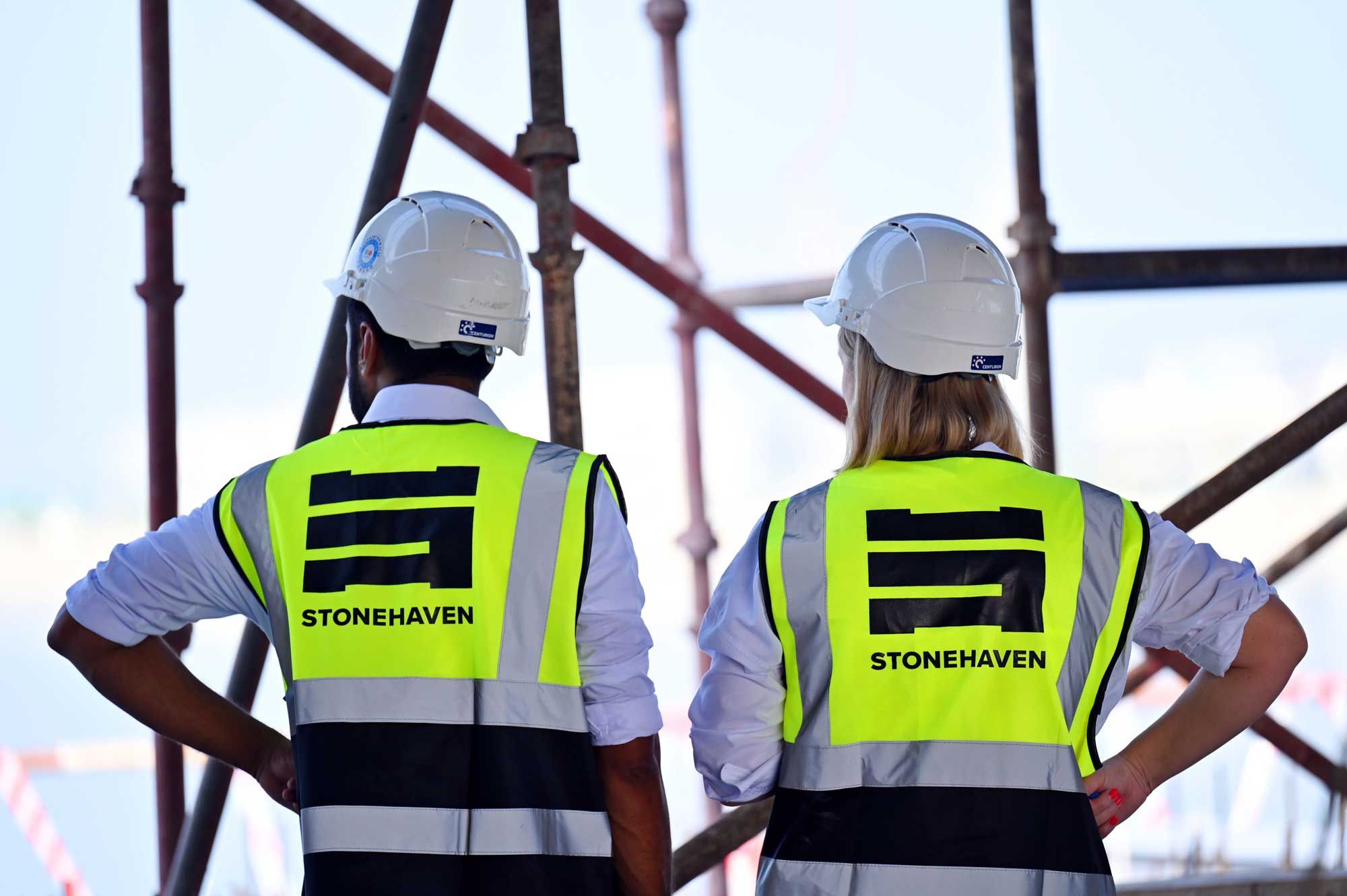Once a contract is signed, the Cost Manager becomes the central figure in monitoring, managing, and maximising the value derived from every pound spent. While much attention is often given to pre-contract cost planning, feasibility studies, and tendering processes, it is the post-contract phase that can make or break a project's success.
From handling valuations and managing variations to administering contracts and finalising accounts, the Cost Manager or QS ensures the client's interests are safeguarded throughout the lifecycle of a construction project. In an industry where unforeseen costs and scope changes are the norm rather than the exception, the importance of post-contract cost management cannot be overstated.
This blog explores the multifaceted role of Quantity Surveyors during the post-contract stage of construction. We will break down the processes, responsibilities, and key differentiators between pre- and post-contract stages, providing insight into how a skilled QS plays a vital role in delivering construction projects on time, within budget, and to the agreed standard of quality. Whether you're a developer, contractor, or consultant, understanding the true value of post-contract quantity surveying is essential in today's cost-conscious construction environment.
What is Post Contract Quantity Surveying?
Post-contract quantity surveying is the practice of overseeing and controlling the financial and contractual aspects of a construction project after the main construction contract has been awarded. While pre-contract services focus on estimating costs and advising on procurement, post-contract services are action-oriented and operational, dealing directly with how the budget and scope are managed throughout construction.

This discipline involves cost control, regular valuations of work done (interim payments), variation tracking, contract compliance, risk mitigation, updating the client with cost reports, and final account settlement. The goal is to ensure that all commercial aspects of a construction project are executed as efficiently and transparently as possible.
Post-contract quantity surveying also includes liaising between all project stakeholders—clients, contractors, consultants, and suppliers—to maintain financial clarity and contractual accountability.
60% of respondents on a recent report stated that they saw an increase in tender opportunities in the past 6 months. A strong pipeline of projects means more post-contract QS engagement to manage budgets and payments. In today's competitive construction industry, post-contract QS services are indispensable for ensuring project profitability and compliance with contractual terms.
What Happens in the Post-Contract Stage of Construction?
The post-contract stage is where planning meets execution. Once the contract is awarded and the site is mobilised, the role of the Quantity Surveyor becomes dynamic. Every instruction, variation, progress update, and payment now carry financial implications and it’s the Cost Manager who navigates these complexities.
What are the Key Activities Happening in the Post-Contract Stage?
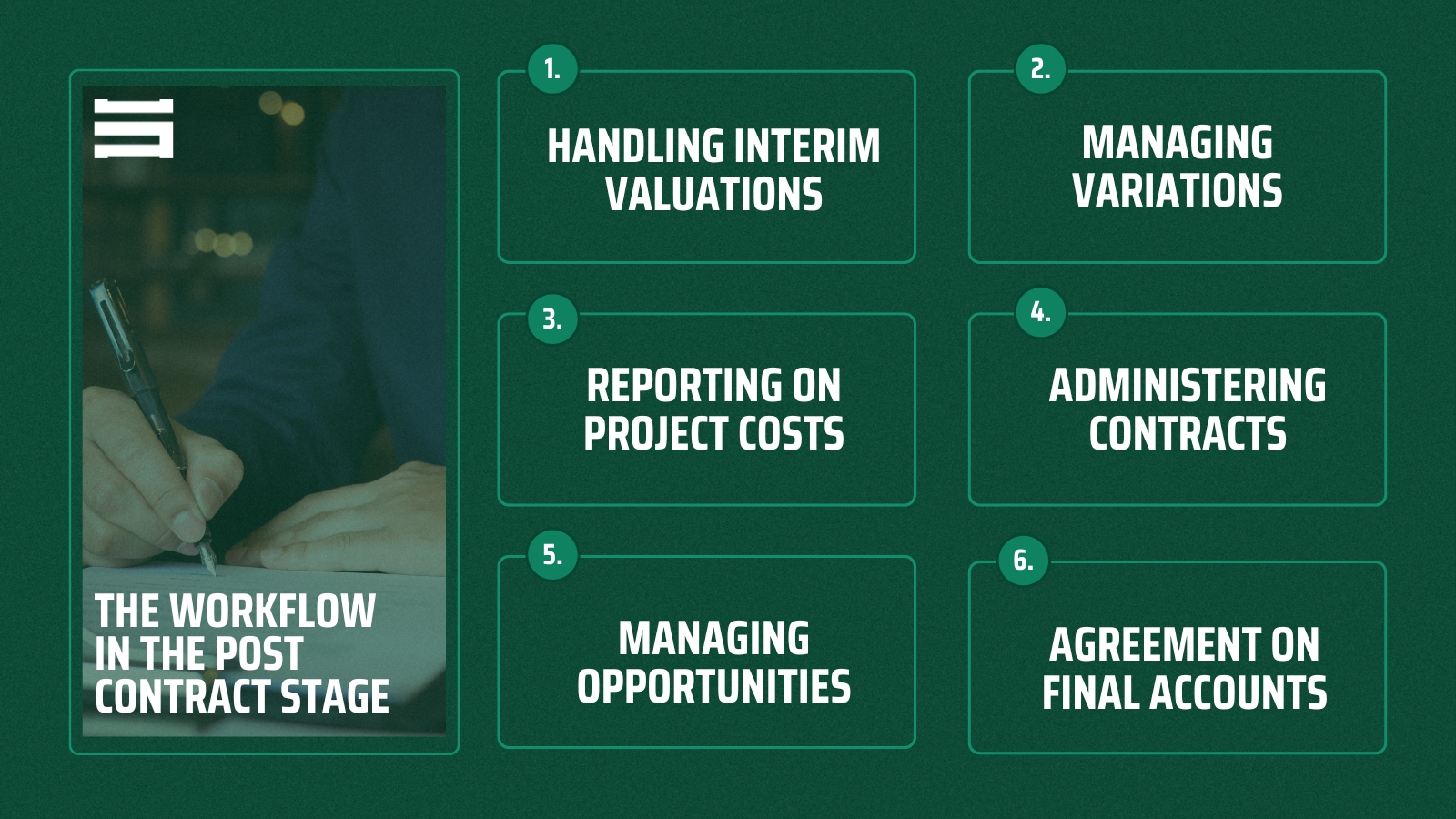
Handling Interim Valuations and Payments
The QS prepares periodic valuations to determine the value of project works completed to date. These valuations form the basis of interim payments to the contractor and must fairly reflect progress while avoiding overpayment.
Managing and Assessing Variations
Changes to scope, whether client-driven or arising from unforeseen site conditions, are inevitable. The QS assesses the cost impact of variations, prepares detailed evaluations, and negotiates their value with contractors.
Monitoring and Reporting on Project Costs
Keeping a constant eye on project costs, the QS compares actual expenditure against the original and revised budgets. This includes forecasting final project costs and providing clients with real-time cost information.
Administering Contracts
Ensuring compliance with the terms of administering contracts is another major responsibility. This includes issuing notices, assessing claims, and managing disputes when necessary.
Managing Risks and Opportunities
The QS also plays a proactive role in identifying cost-related risks and opportunities, working to mitigate the former and capitalise on the latter.
Agreeing on Final Accounts
At project completion, the QS prepares and agrees the final account, which includes reconciling all variations, assessing final payments, and ensuring the financial closure of the project.
In summary, the post-contract stage is a period of rigorous cost management in project management. The QS provides commercial leadership that ensures the project remains on track financially while maintaining quality and timeline objectives.
What are the Roles of a Quantity Surveyor at the Post Contract Stage?
The Quantity Surveyor’s involvement in the post-contract stage is vital in translating the contractual blueprint into commercial success. Below are the core responsibilities undertaken:
1. Cost Control and Management
A QS ensures that all project costs align with the agreed budget. Through continuous monitoring and assessment, they track expenses against forecasts, identify cost overruns, and initiate corrective actions.
2. Interim Valuations and Payment Certificates
The Quantity Surveyor regularly visits the site to assess progress and issue interim payment certificates based on actual work completed. This protects clients from overpaying and ensures contractors are paid fairly and timely.
3. Valuation of Variations
Scope changes are reviewed and valued promptly. The QS ensures that all variations are well-documented and justified before negotiating their impact with contractors. This includes pricing, impact on programme management, and contractual compliance.
4. Setting Change Control Processes
The QS is central to enforcing a robust change control process. This includes logging change requests, assessing cost implications, obtaining approvals, and updating cost forecasts accordingly.
5. Contractual Advice and Dispute Resolution
As disputes or claims arise, the QS provides expert advice on contractual rights and obligations. They compile and assess claims for extensions of time, loss and expense, or damages.
6. Cost Reporting and Forecasting
Periodic cost reports prepared by the QS provide a snapshot of the project’s financial status. These reports help clients understand cost trends, potential risks, and whether the final cost is likely to exceed the approved budget.
7. Procurement and Subcontractor Management
Post-contract duties may also involve managing procurement packages or subcontractor accounts, ensuring transparency and efficiency in payment and performance.
8. Final Account Preparation
One of the QS’s final and most important duties is preparing and agreeing the final account, which includes all adjustments made during the contract. This reconciles the initial contract sum with the actual final cost.
9. Client Representation and Reporting
Acting as a commercial advisor to the client, the QS represents their interests in meetings, negotiations, and decision-making processes. Their reporting and advice often shape critical strategic decisions.
Collectively, these responsibilities ensure that a construction project is commercially sound from start to finish. It’s why the QS post contract duties are viewed as indispensable in achieving successful delivery and financial closure.
What is Post-Contract Cost Control?
Post-contract cost control refers to the techniques and processes used to manage costs during the construction phase after the award of the main contract. Its main aim is to ensure that the project is delivered within the agreed financial parameters, without compromising on quality or programme period.
What are the Functions of Post-Contract Cost Control?
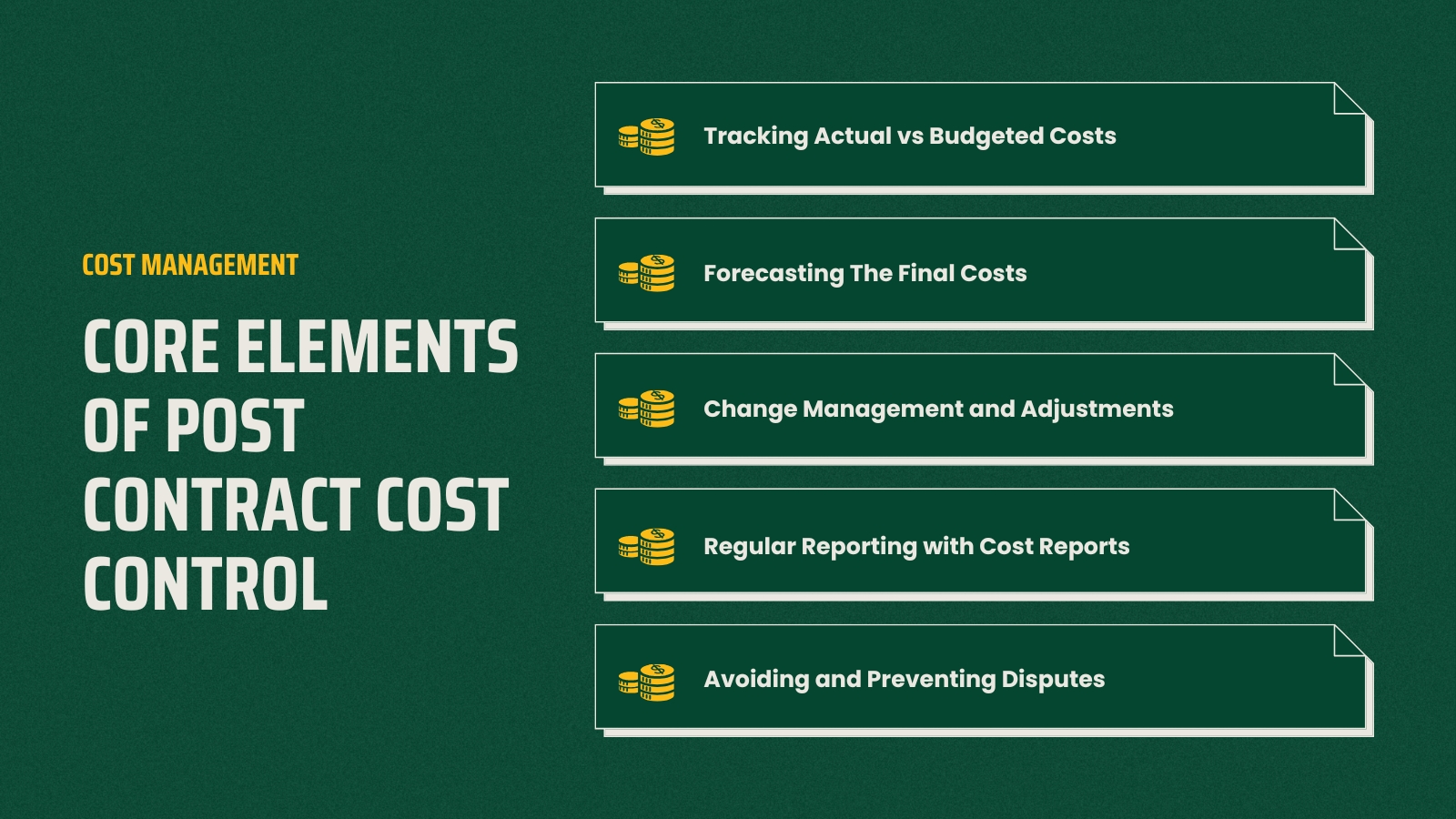
-
Tracking Actual vs Budgeted Costs - Monitoring real-time expenditure against the original budget to identify any early cost overruns.
-
Forecasting The Final Cost - Updating cost forecasts as the project evolves, accounting for approved variations, procurement packages, and market trends.
-
Change Management and Adjustments - Evaluating the cost and programme impact of changes, controlling unauthorised scope creep, and logging all financial adjustments.
-
Regular Reporting with Cost Reports - Providing monthly or milestone-based cost reports to the client, detailing committed, expended, and forecasted costs.
-
Avoiding and Preventing Disputes - Preventing conflicts by maintaining clear and accurate records of instructions, agreements, and valuations.
Effective cost control is critical for maintaining profitability, particularly in fast-track or design-and-build projects. It allows the client to make informed decisions based on current performance, not just initial assumptions. It also builds trust among stakeholders, proving the value of expert cost management services during post-contract delivery.
What are the Differences Between Pre-Contract and Post-Contract Quantity Surveying?
Quantity Surveying spans both pre- and post-contract stages, but the focus and deliverables are distinct across each phase.
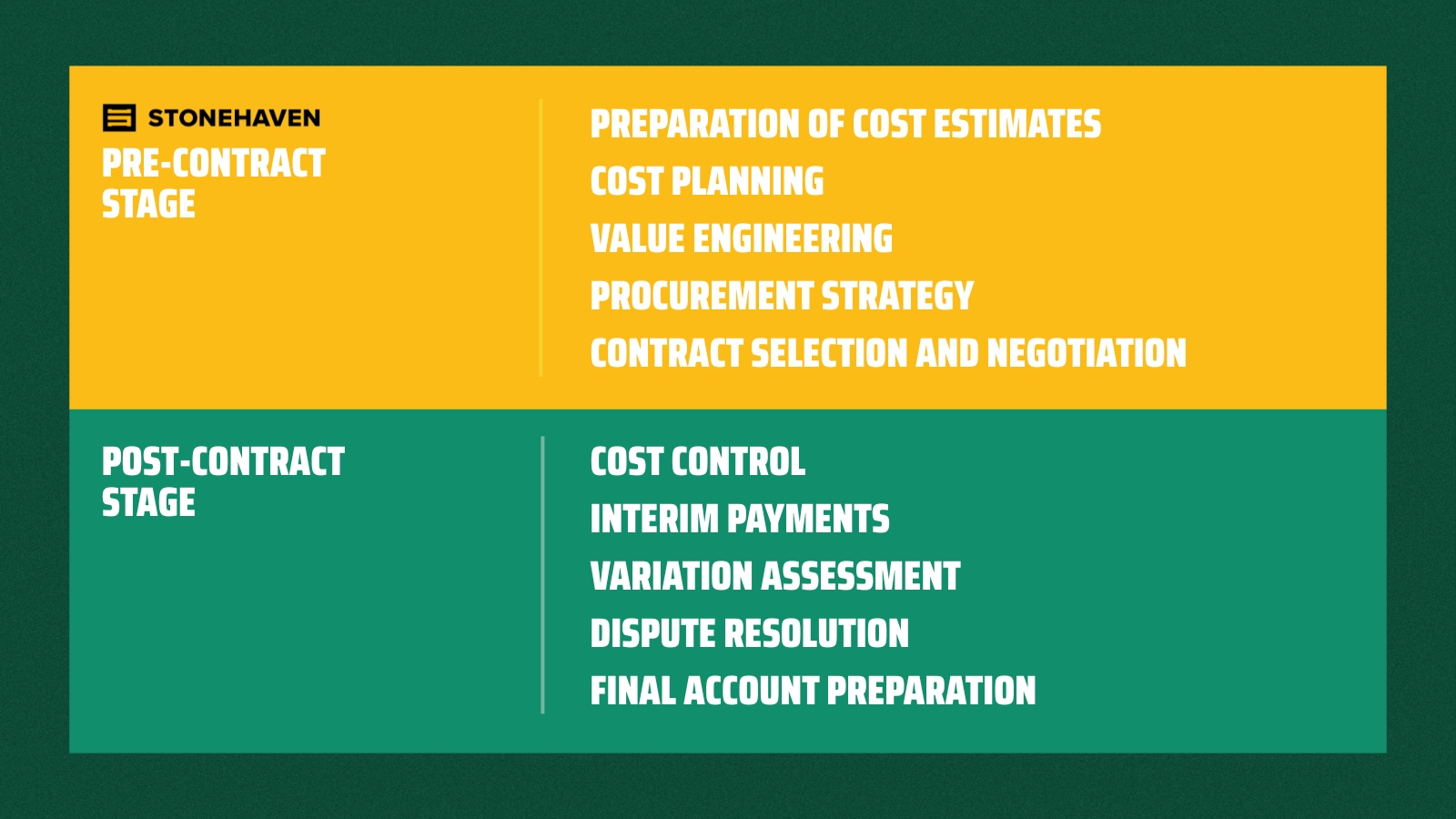
In essence, pre-contract QS work is proactive and planning-based, while post-contract QS work is reactive and operational. Both are equally critical, but it is during the post-contract stage that real-time decisions must be made to protect budgets and ensure contractual compliance. This stage is where the QS’s strategic foresight and commercial acumen truly come into play.
Conclusion
The Quantity Surveyor’s role in the post-contract stage is essential to successful project execution. It combines strategic financial oversight with hands-on contractual management to ensure construction projects remain profitable, compliant, and aligned with the client’s expectations.
From managing interim payments to negotiating variations and finalising accounts, the QS delivers continuous value throughout the construction phase. Their presence offers not only financial control but also peace of mind to clients navigating complex builds.
In a world where projects are increasingly fast-paced, design iterations are constant, and budgets are under more scrutiny than ever, the role of post-contract quantity surveying becomes even more critical. It is this discipline that anchors cost management in project management and ensures quality doesn’t get sacrificed for speed or savings.
By partnering with experienced cost management consultants like Stonehaven, stakeholders can ensure robust cost governance, transparent reporting, and commercially driven decision-making throughout the post-contract journey.
Featured Perspective
This article includes contributions and insights from Niroshan Velu, Cost Manager at STONEHAVEN whose project experience in the industry has shaped much of this discussion.
Niroshan Velu is a Quantity Surveyor with 6 years of professional experience and a Bachelor’s degree in Quantity Surveying. He has worked on a variety of projects and developed a strong set of skills in project management, cost estimation, and risk analysis.
About us
At Stonehaven, we understand that the success of a construction project isn’t determined at award, it’s earned through meticulous execution. That’s why our post-contract cost management services are designed to ensure that budgets remain intact, variations are managed strategically, and stakeholders are always in control.
As expert cost management consultants in the UAE and wider GCC, we offer integrated quantity surveying services that span the full lifecycle of your construction project, from pre-contract advisory to post-contract administration and final account closure. We tailor our solutions to meet the unique commercial and regulatory challenges of each project, ensuring that financial performance aligns with design ambition and delivery targets.
Whether you’re delivering a high-end villa, a mixed-use development, or an infrastructure project, our experienced Quantity Surveyors bring proactive oversight and proven cost control strategies that protect your investment and uphold the highest standards of delivery.
Discover how our Cost Managers can support your next project today.










